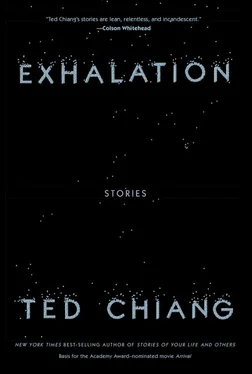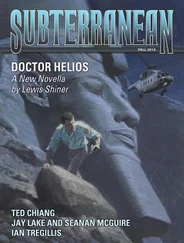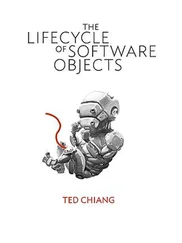The upshot was that a prism wasn’t like a radio connecting the two branches; activating one didn’t power up a transmitter whose frequency you could keep tuning into. It was more like a notepad that the two branches shared, and each time a message was sent, a strip of paper was torn off the top sheet. Once the notepad was exhausted, no more information could be exchanged and the two branches went on their separate ways, incommunicado forever after.
Ever since the invention of the prism, engineers had been working to add more ions to the array and increase the size of the notepad. The latest commercial prisms had pads that were a gigabyte in size. That was enough to last a lifetime if all you were exchanging was text, but not all consumers were satisfied with that. Many wanted the ability to have a live conversation, preferably with video; they needed to hear their own voice or see their own face looking back at them. Even low-resolution, low-frame-rate video could burn through a prism’s entire pad in a matter of hours; people tended to use it only occasionally, relying on text or audio-only communications most of the time in order to make their prism last for as long as possible.
· · ·
Dana’s regular four o’clock appointment was a woman named Teresa. Teresa had been a client for just over a year; she had sought out therapy primarily because of her difficulty in maintaining a long-term romantic relationship. Dana had initially thought her issues stemmed from her parents’ divorce when she was a teenager, but now she suspected that Teresa was prone to seeking better alternatives. In their session last week, Teresa had told her that she had recently run into an ex-boyfriend of hers; five years ago she had turned down a marriage proposal from him, and now he was happily married to someone else. Dana expected that they would continue talking about that today.
Teresa often started her sessions with pleasantries, but not this time. As soon as she sat down she said, “I went to Crystal Ball during my lunch break today.”
Already suspecting the answer, Dana asked, “What did you ask them about?”
“I asked them if they could find out what my life would look like if I had married Andrew.”
“And what did they say?”
“They said maybe. I hadn’t realized how it worked; a man there explained it to me.” Teresa didn’t ask if Dana was familiar with it. She needed to talk it through, which was fine; she was often able to untangle her thoughts that way with only slight prompting from Dana. “He said that my decision to marry Andrew or not didn’t cause two timelines to branch off, that only activating a prism does that. He said they could look at the prisms they had that had been activated in the months before Andrew proposed. They would send requests to the parallel versions of Crystal Ball in those branches, and their employees would look up the parallel versions of me and see if any of them were married to him. If one of me was, they could interview her and tell me what she said. But he said there was no guarantee that they’d find such a branch, and it cost money just to send the requests, so they would have to charge me whether they found one or not. Then, if I want them to interview the parallel version of me, there’d be a separate charge for that. And because they’d be using prisms that are five years old, everything would be expensive.”
Dana was glad to hear that Crystal Ball had been honest about their claims; she knew there were data brokers out there that promised results they couldn’t deliver. “So what did you do?”
“I didn’t want to do anything without talking to you first.”
“Okay,” said Dana, “let’s talk. How did you feel after the consultation?”
“I don’t know. I hadn’t considered the possibility that they might not be able to find a branch where I said yes to Andrew. Why wouldn’t they be able to find a branch like that?”
Dana considered trying to lead Teresa to the answer herself, but decided it wasn’t necessary. “It could mean that your decision to reject him wasn’t a close call. It may have felt like you were on the fence, but in fact you weren’t; your decision to turn him down was based on a deep feeling, not a whim.”
Teresa looked thoughtful. “That might be a good thing to know. I wonder if I ought to just have them do the search first. If they don’t find a version of me that married Andrew, then I can just stop.”
“And if they do find a version that married Andrew, how likely is it that you’ll ask them to interview her?”
She sighed. “A hundred percent.”
“So what does that tell you?”
“I guess it tells me that I shouldn’t have them do the search unless I’m sure I want to know the answer.”
“And do you want to know the answer?” asked Dana. “No, let’s put it another way. What would you like the answer to be, and what are you afraid it might be?”
Teresa paused for a minute. Eventually she said, “I guess what I’d like to find out is that a version of me married Andrew and then divorced him because he wasn’t the right guy for me. What I’m afraid of finding out is that a version of me married him and is now blissfully happy. Is that petty of me?”
“Not at all,” said Dana. “Those are perfectly understandable feelings.”
“I suppose I just have to decide if I’m willing to take the risk.”
“That’s one way to think about it.”
“What’s another?”
“Another would be to consider whether anything you learn about the other branch would actually be helpful. It could be that nothing you find out about some other branch will change your situation here in this branch.”
Teresa frowned as she thought it over. “Maybe it wouldn’t change anything, but I’d feel better knowing that I had made the right decision.” She went silent, and Dana waited. Then Teresa asked, “Do you have other clients who’ve gone to data brokers?”
Dana nodded. “Many.”
“In general, do you think it’s a good idea to use one of these services?”
“I don’t think there’s a general answer to that. It depends entirely on the individual.”
“And you’re not going to tell me whether or not I should do it.”
Dana smiled. “You know that’s not my role.”
“I know, I just figured it couldn’t hurt to ask.” After a moment, Teresa said, “I’ve heard that some people become obsessed with prisms.”
“Yes, that can happen. I actually facilitate a support group for people whose prism use has become an issue for them.”
“Really?” Teresa seemed briefly tempted to ask for details, but instead she said, “And you’re not going to warn me away from using Crystal Ball’s services?”
“Some people have issues with alcohol, but I’m not going to advise my clients to never take a drink.”
“I suppose that makes sense.” Teresa paused, and then asked, “Have you ever used one of these services yourself?”
Dana shook her head. “No, I haven’t.”
“Have you ever been tempted?”
“Not really.”
She looked at Dana curiously. “Don’t you ever wonder if you made the wrong choice?”
I don’t have to wonder; I know. But aloud Dana said, “Of course. But I try to focus on the here and now.”
· · ·
The two branches connected by a prism start out as perfectly identical except for the result of the quantum measurement. If a person has resolved to base a huge decision on the measurement—“If the blue LED lights up, I will detonate this bomb; otherwise, I will disarm it”—then the two branches will diverge in an obvious manner. But if no one takes any action as a result of the measurement, how much will the two branches diverge? Can a single quantum event by itself lead to visible changes between the two branches? Is it possible for broader historical forces to be studied using prisms?
Читать дальше









